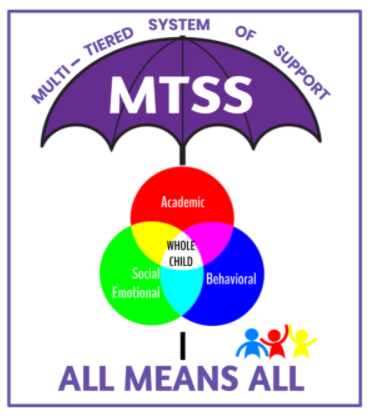
Senate Bill 11 and House Bill 18, passed in 2019, requires schools to address the mental health and wellness of students. To meet this challenge, MTSS provides in intentional and systematic approach for meeting students’ academic and behavioral needs. The multi-tiered system of supports (MTSS) framework can be considered the umbrella for other support systems, such as data-based individualization (DBI), response to intervention (RtI), and positive behavior intervention and supports (PBIS). MTSS encompasses academic, behavioral, and mental health supports for all students. Students in general education and those receiving special education and related services can participate in MTSS. MTSS is not used to delay or deny a child’s right to an initial evaluation for special education services.
The Parent as a Member of the MTSS Team
Parent involvement is a key component of an effective MTSS infrastructure in a school or district. Parents should be invited to engage in the problem-solving process at all tiers of instruction. Parental engagement in the MTSS process is critical for student success. Parental input is a requirement of both the Elementary and Secondary Education Act (ESEA) and Individuals with Disabilities Education Act (IDEA). Schools and districts have a responsibility to keep parents informed and support them in understanding student data, benchmark expectations, and the problem-solving process.
Parental Engagement in Tier I
Different kinds of information should be shared with parents at different tiers of instruction. Specific to Tier I instruction, data reflecting student progress within the core academic and/or behavioral curricula should be shared with parents of all students. During parent-teacher conferences, graphs of student progress should be provided with explanations regarding student performance. Strategies and materials for home instruction also should be shared. Also, parents may want to use a participation form to help them record notes during problem-solving meetings.
Parental Engagement in Tier II
Students receiving Tier II supplemental instruction, in addition to the core academic and behavioral curricula, must be progress monitored more frequently. Reports of student progress also must be shared with parents more frequently at this level. Obtaining parent input and engaging parents at this phase is critical for student success. Parents should be offered specific support regarding skills that need improvement. It might be helpful to provide the parent with written documentation of what data have been collected, the intervention plan(s) put in place to improve skills, and how the plan(s) are monitored. For students receiving additional support through tutoring, schools should make efforts to communicate with the parents/tutor to help bridge the understanding of deficit skills and evidence-based interventions that are being used to address the areas of concern. This helps to ensure that the supplemental intervention being provided is aligned with the core instruction and supports.
Parental Engagement in Tier III
Students receiving Tier III intensive interventions for specific academic or behavioral skills are progress monitored most frequently. Parents should be invited to participate in the problem-solving meetings to analyze their child’s progress (response to the Tier III interventions) and help make decisions about their instruction. Schools should encourage parents to document services that are being provided outside of the school day. Parents should also be provided with detailed graphs and clear explanations of their child’s response to instruction/intervention over time. If the team involved in problem solving is considering the need for evaluation procedures to potentially access special education resources, parents also must be informed of their procedural due process rights under IDEA.
All parent-initiated requests for evaluation for special education services must be honored and expedited in a timely manner in accordance with 19 Texas Administrative Code, §89.1050(h). All schools must provide parents with a copy of the Notice of Procedural Safeguards for Parents of Students with Disabilities at the beginning of the evaluation process or any time by parent request.
Resources

Multi-Tiered Systems of Support
